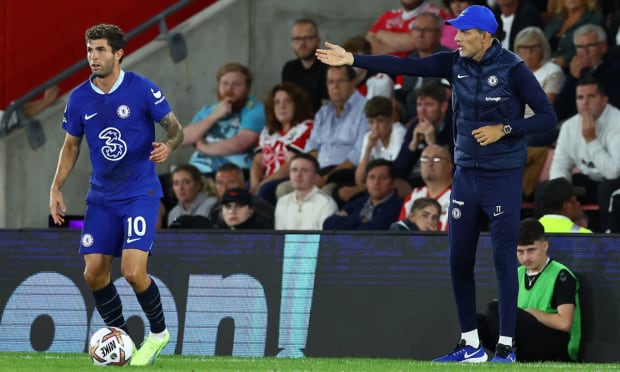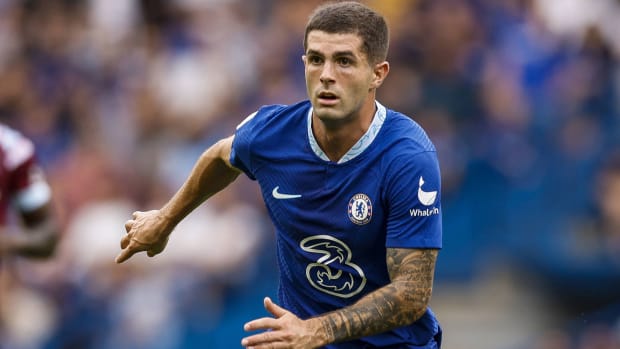Chelsea’s big move doesn’t guarantee an uptick in minutes for the U.S. star, but the way things had been trending under Thomas Tuchel didn’t appear sustainable.
Like those who are personally invested in the success of the U.S. men’s national team and its player pool, Gregg Berhalter took note of the change at the top at Chelsea last week.
Thomas Tuchel’s ouster and Graham Potter’s subsequent hiring as its new manager directly impact one of Berhalter’s top performers, and with the 2022 World Cup around the corner—and the last U.S. camp before the plane leaves for Qatar set to commence in just over a week—Christian Pulisic’s club and playing time situations are once again top of the mind.
It should go without saying, but Pulisic’s national-team standing is not in jeopardy. As long as he’s injury-free, he’s World Cup–bound. But the manner in which he enters the World Cup is of the utmost importance to the U.S. As Berhalter himself has said, when Pulisic plays well, the U.S. tends to play well, and so club performance over the next couple of months will carry some additional significance as it relates to Pulisic’s form and mindset. You don’t tend to just show up at a World Cup and flip a switch.
Pulisic was reportedly denied a loan away from Stamford Bridge this summer, with the player said to be frustrated with his usage under Tuchel and hoping for a greater and more regular role. Given that he was handed one start and five substitute appearances to open the Premier League season and an additional 15 minutes in the Champions League-opening loss vs. Dinamo Zagreb that was the last straw for the club’s manager, it’s not hard to understand that frustration’s origin.

David Klein/Sportimage/Imago Images
But it should be noted that Tuchel’s ouster doesn’t remove Raheem Sterling from Chelsea’s equation, and as long as the English winger is fit, he’s a likelier candidate to start over Pulisic, who tends to feature at the same position. Beyond Sterling, Potter has never had such a vast array of attacking weapons at his disposal at any of his previous stops, so how he opts to deploy Chelsea’s goal-minded talents could differ from how he operated Brighton’s lineup. His arrival at Stamford Bridge still likely means a change to tactics, but even if he is mulling Pulisic as, say, something more of a left wingback, he is already more familiar with Chelsea summer signing Marc Cucurella, his former pupil at Brighton, for such a role. Whether his choices benefit Pulisic remains to be seen.
“I want a tactically flexible, attacking, possession-based team,” Potter said in an interview for Chelsea’s official site on Monday. “Players that are brave, that aren’t afraid to make mistakes. That can get on the ball and show courage and really try to enjoy their football.”
That, for what it’s worth, describes the kind of player Pulisic is, especially when he is at his best.
“If the players are enjoying their football, there’s a chance that the supporters will enjoy it as well,” Potter continued. “That’s how you grow and develop as a club. Styles of play don’t make you win games. The challenge is having players believe in it and how it works. In my position you cannot use time as an excuse. You can talk philosophy, identity, all these nice words, but you have to think in the short term as well. We are in a results game and you have to try and do your best to win.”

Steven Paston/PA Images/Imago Images
There’s still plenty to find out about Potter and his plans, but the simple extraction of Tuchel, a Champions League– and FIFA Club World Cup–winning coach, at least takes away a source of angst for Pulisic and, evidently, Berhalter.
“I’m not happy a guy lost his job. But if this means more opportunity for Christian, then it’s positive, because he’s a guy that’s proven that he can perform at that level,” Berhalter said last week. “We’ll just have to wait and see.”
And ultimately that’s the crux of it. With Tuchel at the helm, the known quantity was that Pulisic wasn’t going to be a regular performer. Tuchel had his reasons, and Sterling being Chelsea’s most dangerous attacking player certainly didn’t help either. With Potter, there’s plenty of unknown that has entered into the equation and that unknown represents, as Berhalter put it, “opportunity.” It’s on Pulisic to seize that or show Potter that he is at least worthy of it, provided the manager doesn’t have a predetermined sense about the player.
Pulisic is now onto his fourth manager at Chelsea in just over three years (Maurizio Sarri, Frank Lampard, Tuchel, Potter). Such is life at one of the major clubs around Europe—and especially at a quick-trigger club like Chelsea, no matter the owner—but it doesn’t help a player settle and perform, especially when there’s constant spending to improve the overall level of the squad.
Another oddity for Pulisic is that given the timing of the coaching change and the postponement of this past weekend’s match vs. Fulham, the first glimpse of what Potter’s Chelsea may look like will come on the Champions League stage vs. RB Salzburg. Four days later, there’s a league match vs. Liverpool, provided that, too, doesn’t get postponed on account of Queen Elizabeth II’s funeral in London. There’s little time to introduce new concepts and shake things up too drastically considering the stakes at hand, something that, in the short term, may not favor Pulisic off the bat.
So, not for the first time in recent weeks, Pulisic’s words from the summer regarding what it's like to be a player at Chelsea are appropriate once again, even if the circumstances surrounding him have changed.
“It’s not always going to be easy,” he said. “I have to continue to prove myself and constantly perform. But that’s what you sign up for when you come to a club like this, and that’s what I’m just constantly ready for.”
Pulisic spent this weekend trying to prepare himself for his new task, but elsewhere it was a relatively quiet weekend for U.S. players abroad in general, due in large part to the postponement of matches in England and Scotland following the death of the queen. A few active, attacking players did register some notable performances, though.
Ricardo Pepi technically recorded an assist in his Groningen debut, playing for the first time since being loaned by Augsburg to the Dutch said. It began with his pressure and relentlessness to win a ball in the center circle. He then laid it off to his right, some 35 yards from goal, and teammate Tomáš Suslov did the rest, carrying the ball forward, cutting to his left and scoring from the edge of the box. It was an assist nevertheless, and it marked Pepi’s first goal contribution since leaving FC Dallas for Europe, and his performance overall represented a productive step in the right direction for a player trying to get back into the U.S. mix.
Another forward seeking a return to U.S. camp—the roster for this month’s gathering is due out on Wednesday—is Jordan Pefok. The striker had been in top form to begin the season but had an early penalty saved on Sunday in his return following a muscle injury (his Union Berlin ascended to first place in the Bundesliga anyway following a win over Cologne). After a spotty call, Pefok opted to fire his spot kick low and down the center, and it was duly denied.
Elsewhere in the Bundesliga, Gio Reyna played the last half hour for Dortmund in a loss to Leipzig and former manager Marco Rose. That itself is not so remarkable, but that it came just four days after his longest runout since returning from long-term injury woes represents progress. Reyna played 67 minutes off the bench in the Champions League last Tuesday (and notched two assists vs. Copenhagen in the process), and Dortmund is being mindful of his minutes. A good indicator of where he is at prior to the upcoming U.S. camp will come Wednesday against Manchester City.
More Soccer Coverage: